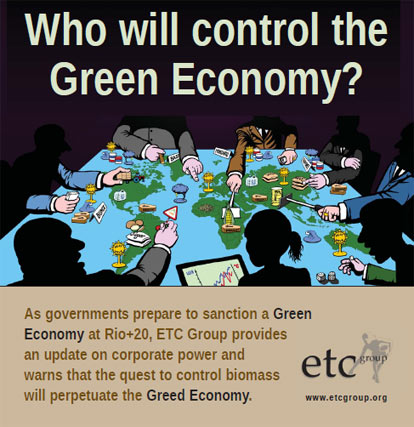 From the UN Rio+20 preparatory meetings in New York, ETC Group today launches ‘Who Will Control the Green Economy?‘ The 60-page report connects the dots between the climate and oil crises, new technologies and corporate power. The report warns that the world’s largest companies are riding the coattails of the “Green Economy” while gearing up for their boldest coup to-date – not just by making strategic acquisitions and tapping new markets, but also by penetrating new industrial sectors.
From the UN Rio+20 preparatory meetings in New York, ETC Group today launches ‘Who Will Control the Green Economy?‘ The 60-page report connects the dots between the climate and oil crises, new technologies and corporate power. The report warns that the world’s largest companies are riding the coattails of the “Green Economy” while gearing up for their boldest coup to-date – not just by making strategic acquisitions and tapping new markets, but also by penetrating new industrial sectors.
DuPont, for example, already the world’s second largest seed company and sixth largest company in both pesticides and chemicals, is now a powerhouse in plant-based materials, energy and food ingredients. DuPont’s business plan is not unique. Other major players in seeds, pesticides, chemicals and food – including Monsanto, Syngenta, Dow, BASF and Unilever – are also making strategic investments in risky technologies and forming R&D collaborations in hopes of turning plant biomass into all kinds of high value products – and profit.
Since the turn of the millennium, the vision of a bio-based economy has been taking shape; with its promise to solve the problems of Peak Oil and climate change and to usher in an era of sustainable development, it quickly acquired a patina of ‘green.’ New technologies, primarily synthetic biology or extreme genetic engineering, enabled by advanced bioinformatics and genomics, are the bioeconomy’s engine while agricultural feedstock is its fuel.
While seductive, the new green techno-fixes are dangerous because they will spur even greater convergence and concentration of corporate power and unleash privately owned technologies into communities that have not been consulted about – or prepared for – their impacts. If the “Green Economy” is imposed without full intergovernmental debate and extensive involvement from peoples’ organizations and civil society, the Earth Summit to take place in Rio de Janeiro 20-22 June 2012 risks becoming the biggest Earth Grab in more than 500 years.
ETC Group’s Kathy Jo Wetter explains: “The goal is not to reject the green economy or technologies, but these are tools that must be guided by strong social policies. Agenda 21 called for technology assessment back in 1992 and the need for such a precautionary tool, that includes strict oversight of corporate concentration, is now more urgent than ever before.”
Alberto Gomez, of La Via Campesina, adds: “Corporate control over our food system threatens peasant farmers around the world. We already produce 70% of the world’s food, but our ability to do so in an agro-ecological way is being undermined by the kind of corporate control this report documents.”
Who Will Control the Green Economy? will be launched at the Rio+20 Intersessional meeting taking place in New York on December 15-16. Kathy Jo Wetter, one of the report’s researchers, will present the findings on Thursday, 15 December 2012, at 7 pm at a side-event on Agriculture at Rio+20, in Conference Room 6, North Lawn Building at the UN Headquarters. Alberto Gomez will also speak at this event.
‘Who will control the Green Economy?’ is available in English (http://www.etcgroup.org/en/node/5296), Spanish (http://www.etcgroup.org/es/node/5298) and will soon be available in French.
Contacts
In New York:
Diana Bronson
cell 514 629 9236
email: Diana@etcgroup.org
In Montreal:
Jim Thomas
cell 514 516 5759
email: jim@etcgroup.org
About ETC Group
ETC Group (Action Group on Erosion, Technology and Concentration) is an international civil society organization. We address the global socioeconomic and ecological issues surrounding new technologies with special concern for their impact on indigenous peoples, rural communities and biodiversity. We investigate ecological erosion (including the erosion of cultures and human rights), the development of new technologies and we monitor global governance issues including corporate concentration and trade in technologies. We operate at the global political level and have consultative status with several UN agencies and treaties. We work closely with other civil society organizations and social movements, especially in Africa, Asia and Latin America. We have offices in Canada, USA, Mexico and Philippines.
- More informations
- What you will find in the ‘Who Will Control the Green Economy?’ Report – Dec 2011(PDF)
- Other documents on Rio+20 here: http://www.etcgroup.org/en/rio
Source
etc group, press release, 2011-12-15.
Supplier
BASF SE
Dow Chemical Company
DuPont
ETC Group (Action Group on Erosion, Technology and Concentration)
Monsanto Company
Unilever
Share
Renewable Carbon News – Daily Newsletter
Subscribe to our daily email newsletter – the world's leading newsletter on renewable materials and chemicals













